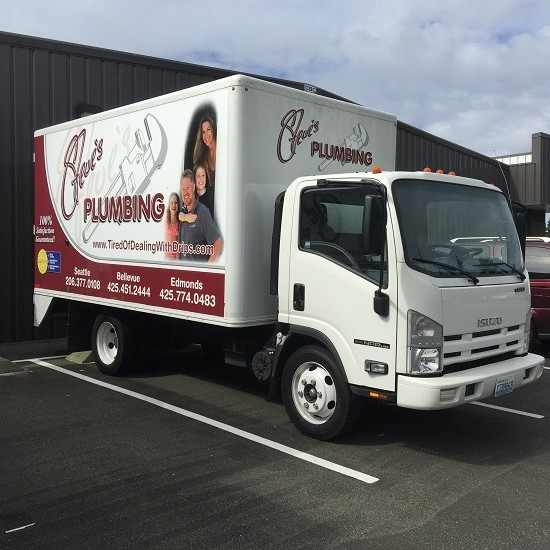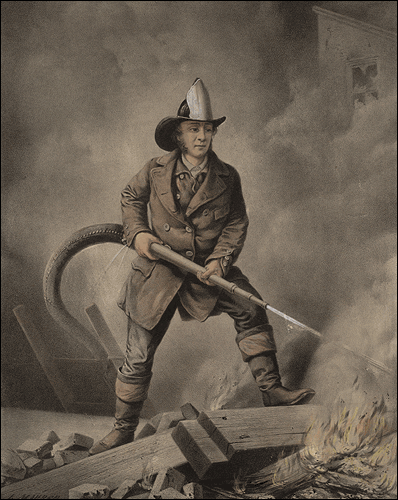
Last year, we ran a series of articles extolling the virtues and eliminating the myths of the skilled trades. While we were able to cover a lot of ground, there wasn’t room to provide a detailed picture of all the various trades out there for men to pursue. So, as an accompaniment to our So You Want My Job series, we’ll be running regular installments of So You Want My Trade: interviews that offer an inside view of the pluses and minuses of various blue collar career choices.
If your idea of a plumber is an uneducated, unkempt, overweight man with generous butt crack showing, you need to think again. They may have a poor reputation in pop culture, but plumbers truly help keep our nation’s infrastructure running. Without them, we’d literally be swimming in crap. Beyond the industry’s necessity, it can make a great career, even for the entrepreneurial type.
I had the pleasure of talking with Steve Egner, owner of Steve’s Plumbing in Washington state, about his work and his business. It was an enlightening conversation, and I guarantee you’ll learn something new about being a plumber. Heck, maybe you’ll even be making plans to pursue a new career!
1. Tell us a little about yourself (Where are you from? How old are you? Describe your job and how long you’ve been at it, etc.).
I just turned 55 years old. I’ve been a plumber since 1978. I grew up in Austin, Texas. I went, briefly, to the University of Texas, but I was persuaded by a friend to go into the plumbing field. So I picked that up, and over time, became adept at it and realized I could make a living at it, so I continued.
I obtained my first license in Austin in 1983. I moved to the northwest in 1986 and opened Steve’s Plumbing in 1995. So this is our 20th year in business, and we’ve been adding employees and growing very deliberately since 2006. We’re by all accounts a small business and a successful one.
2. Why did you want to get into the plumbing industry? Was it something you always knew you wanted to do?
Absolutely not. I used to joke with people who’d ask me, “How did you get into plumbing?” I’d tell them, “I must’ve done something really bad in a former life.” Most of the people in the industry are here by accident. Most don’t grow up in a family plumbing business, or if they do, they don’t end up in plumbing. It’s just one of those things, when an opportunity arises, you’re helping a friend, next thing you know, you’ve been doing it for a year. Then, you find it’s a lifetime trade and skill. A lot of people find it by accident; that’s certainly what I did.
3. Tell us a little bit about what you do as a plumber. I’m sure it’s more than just fixing leaky faucets and de-clogging toilets.
We train our men to be diagnosticians. Plumbing problems rarely present themselves easily, so they have to be in possession of critical thinking skills to go and determine the root cause of a problem. For instance, a leaking faucet might simply be a symptom of a greater problem. A plumber should go in and as part of his diagnosis be checking the water heating system, the water temperature, water pressure, etc., and there may be clues that there is a systemic problem greater than just that one problem that presents itself.
And then when we find that, we’ve got to be able to convey, in simple terms, for a homeowner, exactly what is wrong and what we’re going to do to cure the problem. And then we have to be prepared to justify our costs because, like every skilled trade, plumbing is expensive, and materials are expensive. But the homeowner is going to compare their particular repair to the cost of a fixture or a part that they can find in a home center, because these days home centers are selling materials for virtually wholesale cost. If we go in to replace a toilet, and we say that’s a $700 purchase, and the homeowner says, “I saw one at home depot for $85,” we’ve got to be able to justify that difference in our pride, our workmanship, the quality of the material that we’re presenting, and our warranties. And that takes a communicator. If you’ve got a strong and silent type who doesn’t think on his feet, then he’s not going to go very far.
4. What was your path to becoming a plumber? What kind of training and certifications did you need?
The best way is to go the old-fashioned route through apprenticeship. An apprenticeship means that a young person finds his way into a reputable company and is trained by multiple technicians, or, in my case (and I think the best case) works one-on-one with a master of the trade. So, you find a small company where the Master is perhaps in his waning years (frankly those begin typically in a person’s 40s). Then, basically you shadow him for months, and you’re learning what parts and tools are. Then, pretty soon, you’re adept enough to determine the needs, and you’re able to have the tool or part in hand as it’s needed. Then, you’re good enough to handle some tasks on your own, then some tasks without supervision.
States vary as to different requirements for licensing, but in Washington state, an apprentice has to accumulate 6,000 hours with supervision in the plumbing trade in order to obtain a license. With 2,000 hours a year, on average, it’s about 3 years. Some guys take 4 or 5 years, some people never obtain a license. I happen to come from a state where licensing was not just a legal requirement, but it was enforced by pride in the community.
So, after 3 to 4 years, an apprentice is able to take the examination and obtain his first level of a journeyman license. Once he’s got his license he can work without supervision in residential and commercial structures up to three stories, and then after he’s accumulated another 2,000 hours of experience, then he’s able to take the journeyman exam, and that will allow him to do work in any building in the state. And really, I think that the learning curve is pretty steep. I wouldn’t trust a three-year journeyman to work unsupervised. That would be an exceptionally talented, very rare individual. I think most people are confident and have gained enough skill to actually be effective in the trade somewhere between their 5th and their 8th year. By the time they’ve got ten years, then things can really move for them and it’s automatic, and by then I’d consider them a real master of their skills. But, these days, a plumber following an apprentice path in our shop can work 3 to 4 years, and be well on his way to $70,000 to $120,000 a year.
5. Did you go to trade school?
No, I did not. I worked one-on-one with a master plumber. He was a terrific guy who followed and shadowed his father, so he did come from a family business. He worked with his father from the time he was eight years old. He was fully employed as a teenager and didn’t finish high school. He just took over the family business. When he moved to Austin, he was a young man still in his mid-twenties, and needed a helper. I was either just 18, or I might’ve still been 17 when I first started with him. Even though he was in his mid-twenties, he had already done the trade for longer than a lot of 40-year-old plumbers because he worked with his dad from the time he was 8 years old, so he knew a lot, and he conveyed a lot to me — especially the pride that goes with the trade.
6. What would you recommend for someone going into plumbing today? Trade school, or just going to a small shop like yours and saying “I want a job”?
Both routes are available. I’d say that the trade school route is typically going to steer a candidate toward a commercial field, so he might be more apt to work for a union shop or commercial projects, and that has its pluses and minuses like anything else. Residential shops typically are dominating the service industry.
Now, I wouldn’t recommend that an aspiring plumber hire on with building new construction, or doing production work. You might learn plumbing skills, but what you’re really going to learn is production skills. You’re not going to learn anything about communicating with the customer. You’re not going to learn anything about best practices or diagnosing problems that would really enable you to step up in the industry. Frankly, those type of shops are turn and burn shops, their employee turnover is high, the benefits are usually non-existent, and the paydays are considerably lower. Our service industry needs people who’ve got great communication skills and mechanical skills. That’s a tricky combination.
7. How do you find work as a plumber? Through a union? What’s the job market like?
You know, trade schools are usually packed by unions, so typically the larger mechanical shops and union shops will follow the trade schools, and will tap those candidates for applications because they’re learning hands on. Nothing wrong with union shops, they just operate on a different type of project than we do. They’re perhaps on a school or industrial project for months, or even years at a time. And their skills are monitored and unions protect their rights. I’ve never had any personal experience with a union although I’ve had friends who’ve worked for the plumbing union, and found it excellent. So, I figure if a person wanted to take that path, the best way is to go through nepotism — find someone who’s family or a friend or a relative who’s in the union and approach them because that works. That’s often how unions hire. They network from within. And I don’t use nepotism derogatorily. That’s just a fact, that’s the way it is.
Another route to take would be to look and see who the dominate service players in your area are. Just check out plumbing companies on the internet, check out their Better Business Bureau ratings, check out their Attorney General rating, and see what kind of company they are. If they advertise best practices, but then they don’t uphold those, that’s not the kind of company you want to work with. There’s a huge number of employees and owners out there who have no understanding of basic ethics, and they give the plumbing trade, and I think any service industry, a bad name. But, you can tell a lot by researching a company, reading their online reviews, and going through the Better Business Bureau and Attorney General’s office to see how they’re rated. Approach those shops with a good, well-rounded resume that proves some technical skill (not necessarily in the plumbing field), and prove to them that you want to work hard and be a plumber.
8. Tell me a little bit about an average work day.
I can tell you what I did yesterday. A technician calls me for a job, and the customer says she has a slow laundry drain, so when she runs her washing machine, it backs up the pipe and floods the floor. We go over there and we don’t just immediately attack the drain; we ask her if it’s ever happened before. This particular customer says yes, it has happened before. In fact, this happened less than three months ago, it happened 6 months before that, and about two years before that. That tells me that the frequency of the problem is increasing, and we put that together with the age of the house, about 40 years.
Then I ask, “When was the last time someone looked at your piping system in the crawl space?” We went down to the crawl space and found that the washing machine had been relocated at some point in the home’s history. So, we’re not going to be able to correct it just by poking a hole with a drain or cable machine. We’re actually, for long-term success, going to have to do a major change in the plumbing in the crawl space, making sure the piping is proper code size and has the proper fitting arrangements.
I was able to get in and clean out the line more thoroughly than it’s ever been cleaned before, and provide her with a temporary situation. But, long-term, she’s going to have to do a more expensive solution. So, instead of going in and just cleaning the drain, I actually probably spent three hours with that customer. Even though she couldn’t begin on the more expensive repairs, she’ll at least know what to budget for a repair that will resolve the problem permanently.
We finished that one, and then we get a call about an outside faucet leaking. We go out, and we find that actually all her outside faucets are leaking, and that immediately clues me in to a pressure problem. So I tested their water pressure and found out that it was excessive. There’s a lot of new construction in the area, and the city authority has boosted the water pressure to allow for further development and an additional hundreds and hundreds of homes in the area, but they don’t inform the homeowners. The homeowners simply have running toilets, dripping faucets, leaking outside faucets, etc., and this person needed a pressure incubator. She also needed those fixtures replaced that had already been damaged by the high pressure. That was a call that again took a few hours, a diagnosis, and some skill.
And, then, in another call, we had a simple toilet problem. We can correct problems with a 20-year-old toilet with several options or repair levels using the existing toilet, or we can also get the customer a brand new toilet that actually does a better job of flushing with considerably less water. On that call, we sold a complete replacement toilet.
That was a typical day, and that took me getting in the field from about 8:30 in the morning to about 6:30 at night, because each call lasted several hours and there’s travel time in between. This is a great job for someone who likes variety. There are a lot of people who thrive on monotony, and want to go to the same place every day, and do the same thing every day. That kind of job would drive me nuts.
I get a lot of face-to-face interaction with customers, and they want long-term relationships with us. We want them to ask for our technicians by name, and so we want the plumbers to take the time to have conversations and build rapport. It’s not just a simple transaction, it’s a relationship. It’s the same kind of relationship that a person wants to have with their attorney, with their physician. We consider ourselves professionals in preserving that relationship too.
9. What is the work/life balance like as a plumber?
It’s up and down. The notion of balance is an interesting one. We’ll always have people that complain about it being too slow or too fast. They might think it’s too slow when there aren’t enough jobs for every plumber to have, say, two to three service calls a day. Ideally, I’d like to have two, two and a half calls on average, per person, per day. But, if we get less than that, they’re going to complain because it’s too slow. Seasonally, we’re now in the busy season. Then we’re working from 7:30 in the morning till 7:30 or 8:00, sometimes later. Then they complain because it’s too busy. The one constant is, they’re complaining. A plumber has to learn to work when it’s productive and accept the down times.
Now, with a contractor or a union job, it is going to be completely different. They’re going to be contracted for a certain amount of hours a day based on what the contractor agreed with the general contractor until the project is finished. The men have superb protections and overtime benefits, and it’s fantastic. But most of the time, those guys punch a clock at 7 in the morning and they’re finished at 3 in the afternoon. They take lunches and breaks, and everything goes like clockwork.
That’s not the life of a service person. It takes a lot of discipline to give your third customer or fourth customer of the day the same level of service you gave the first customer of the day, because you’re more tired. You’ve put 10 hours in, and you have another call to go to, and you still have to show that person the same attention and care. So, that can be really difficult.
One of my plumbers, including myself, is going to be on weekend call every weekend. If you’re on call, you’re going to work Monday through Friday, Saturday, Sunday, and Monday through Friday the next week, so there’s going to be 12 days straight. So balance is incredibly elusive. It’s not the career for balance.
The trade off for that is that you can easily make over $100,000. I had one plumber last year who actually net $120,000. He did not really achieve balance — he was away from home a lot and doing one weekend call a month. But he had great compensation and great benefits.
I can look at my men and I can tell them with all honesty, “In the next ten years, every one of you can make a million dollars. I can not only provide you a secure working base, but provide security for your retirement too.” And not all working trades are doing that. I think that’s pretty darn rare.
10. What would you say is the best part of your career?
I think the best part is knowing that after this many years, in this area for 20 years now, we’ve seen an impact and we see recognition. Knowing that we’ve built a reputation of fairness. We’ve done between 2,500 and 3,000 service calls a year. You’re going to have complaints and you’re even going to have people you can’t satisfy. But, the bulk of those appointments and the bulk of those calls are very happy with us. We want to grow the company, and we’re building it on the foundation of the thousands of customers we’ve served faithfully.
11. What is the worst part of your career?
By far the worst thing about being a residential service plumber is the potential for contact with human waste. Clogged or broken sewer lines still require hands-on attention. A broken sewer line in a crawl space or basement can be pumped out and treated before a repair is made, but the conditions are still foul. Some homes require sewage ejection systems; picture a large garbage can with a pump inside needed to collect all of the home’s sewage and pump it to a higher connection. When any part of that system fails, a plumber is asked to address the most foul concentration of waste possible, and make it right again. Experience gradually hardens us to these conditions, but care must always be exercised to limit contact and prevent disease with body suits, eye protection, rubber gloves, and more.
12. What is the biggest misconception that people have about being a plumber?
Probably that we’re ill-educated, poorly spoken, uninformed, rednecks. I think a lot of people have that perception of the trade. I’ve known plumbers who are wonderful artists, musicians, and pride themselves on their leadership skills. They’re people from all walks of life, and just because they’ve found themselves in a service trade doesn’t mean that they’re not educated. They’re adept and mentally strong people to be able to survive and keep their dignity and keep their self-confidence in a culture that, basically, diminishes the value of service industry workers.
13. Do you have any final advice, or tips, or parting words?
I’ll leave with a couple quotes about this fine trade:
“The Plumber protects the health of our nation.” –slogan originating in early 20th century
“If I would be a young man again, and had to decide how to make my living, I would not try to become a scientist or scholar or teacher. I would rather choose to be a plumber or a peddler in the hope to find that modest degree of independence still available under present circumstances.” –Albert Einstein, 1954
Steve also wanted me to make sure that our readers know he’s hiring! He had this to say about the position(s): “I’ll assist with transfer from out of state and Washington State licensing requirements. Full medical, dental, and vision insurance for technician and family, 401K contribution, paid vacation, proven six-figure income potential.” Contact him through the employment page on his website.
Tags: So You Want My Job






